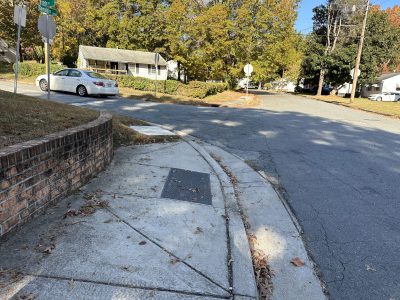by Jordan Green
The Forsyth County Board of Elections dismisses school board candidate Katherine Fansler’s protest, but Elections Director Steve Hines takes responsibility for widespread missteps with misplaced ballots, ballot tabulation, double voting and ballot accounting, while pledging to fix problems going forward.
The Forsyth County Board of Elections dismissed a protest filed by school-board candidate Katherine Fansler during a preliminary hearing on Monday, finding no probable cause to believe that violations of election law, irregularities or misconduct occurred.
Fansler, who left her job as a public-school teacher in Forsyth County and took a job in neighboring Guilford so that she would be eligible to run for school board in her home county, alleged widespread irregularities in her protest. Fansler called attention to a batch of curbside early-voting ballots that were temporarily misplaced, other ballots that were counted twice and paperwork with irreconcilable totals filled out by precinct judges on election night.
Fleming El-Amin, the sole Democrat on the three-member county elections board, said he based his vote for dismissal, in part, on the fact that all the remedies sought by Fansler had already been fulfilled. They included a request for the board of elections to provide chain of custody reports for each precinct and for an audit to be completed to ensure that all ballots were properly accounted for and included in the official results. If additional ballots were discovered, Fansler said she wanted the results to be retabulated, and if necessary for a new election to be ordered.
A recount was conducted at Fansler’s request on Nov. 27 and 28 that changed the margin of votes between Fansler and Mark Johnson, the Republican candidate who won the third at-large seat, from 317 to 303. Each voter was allowed to vote for up to three candidates, but some chose to select only one or two.
“Out of 109,000 ballots, there’s only one ballot that was not accounted for,” said Ken Raymond, the Republican chair of the local elections board. “That’s what the recount discovered.”
Fansler could not attend the hearing because she had to be at work. Frank Leak, a lawyer, attended the hearing to monitor deliberations for Fansler.
“I’m here on a personal mission,” he said, adding that he had not been retained by Fansler.
Fansler said Monday evening that she does not plan to appeal the decision.
“What I wanted was there to be some accountability on the part of the board members and Director Hines for the irregularities that occurred,” she said. “They did admit to discrepancies and problems that needed to be corrected and improved moving forward. Ultimately, the protest did serve its purpose. While an appeal would have shed further light, as a teacher I would be choosing between my responsibilities in the classroom and to my school, which are great, and pursuing this appeal.”
At the beginning of the hearing, Raymond broached the possibility of dismissing the protest because, he said, based on its content, it appeared to be a “revised” protest rather than an “amended” protest as set out by state law. The two other members brushed aside the distinction, overruling Raymond to allow the protest to continue.
Later, after all three members had reached a consensus that the protest did not meet the requirements of probable cause, Raymond unsuccessfully sought a finding that Fansler had not filed her protest in a timely manner. Fansler had written in her amended protest that because she had not been given complete information, she was unable to meet the deadline, adding that Elections Director Steve Hines admitted he had been “unable to complete an accurate accounting of the ballots at this time, more than two weeks after the election.”
Raymond expressed suspicion towards Fansler’s explanation.
“She filed the amended protest on Nov. 21, and the documents still weren’t ready,” he said. “To me, that’s a little shady, for lack of a better term.”
Board members from both parties expressed confidence that the official result of the election was accurate, but acknowledged the need for improvement.
After the hearing, El-Amin said chief judges need better training to avoid problems such as partial counts in some precincts and sloppy reporting on paperwork to account for ballots in others. But responsibility for a batch of curbside early-voting ballots not being counted on election night lands squarely with the elections director, he said.
“That was rectified,” he added. “I was very critical of that internally.”
Hines said during the hearing that no mistakes were made that would have changed the outcome of the election.
“I would just emphasize the official results from this office we have high confidence in, because we fully recounted those official results, and that recount verified the accuracy of the official results,” said Stuart Russell, a Republican member of the board. He added that he hopes election night reporting will be more accurate and less confusing.
Russell acknowledged that Forsyth County was the last elections office in North Carolina to report its results to the state.
“On election night our priority is to be accurate,” he said. “Speed isn’t the priority; it’s not as important as accuracy. When we’re looking at how quickly we reported on election night, I think the machine we had was responsible for how long it took. I would propose that if we can convince our county commissioners to allow us to get a more modern, quicker, more reliable machine….”
Hines offered a broad ranging account of problems that occurred on election night during the hearing, while also setting forth a number of remedies. He took responsibility for his staff initially not counting the curbside ballots.
“This is no excuse, but it is something to keep in mind,” Hines said. “This office is two positions down. We have two unfilled positions. We were behind the eight ball from the beginning.”
He continued: “The curbside ballots that were found, we’re going to have a procedure in place in the office to make sure this does not happen again. It shouldn’t have happened this time, but it did.
“We had the two partial precincts that were read in from the card. We then identified from the chief judges that they did not have a full count; they had a partial count. We’re going to change the way that we do precinct returns so that this doesn’t happen again. We will have to have the chief judge sign off that what’s on that card is returned to us as a full count of the ballots that were cast at that precinct.”
The elections director also addressed sloppy accounting by chief judges on chain of custody forms.
“We’re going to stress to the chief judge about balancing out the number of ballots that were cast versus ballots issued,” he said. “We have done a very lengthy audit process that is public knowledge…. We will do that more efficiently next time. Obviously if we had chain of custody forms that are filled out correctly at the precinct, that process in the office will go a lot smoother.
“We had a couple cases where ballots were read in that shouldn’t have been read in. For example, we had some provisional ballots that made their way into the M100 [machines]. Proper procedure that should have been followed, as poll workers were trained to, was to mark a ‘P’ on any ballot that was a provisional ballot, so if it does go through the M100 it can easily be pulled out. The cases that we have identified here they did not mark those ballots with a ‘P,’ so we could not pull those out. So that’s a failure on that chief judge’s part to follow that procedure.”
Hines has said previously that he is firing a chief judge who allowed 49 voters to cast their ballots twice, and El-Amin said he had no doubt that the board will back the decision.
“Unfortunately, in the elections business a lot of times, what makes good talking points in chief judges training is past failures — past experiences,” he said. “And we have enough issues that we can talk about and things to correct when we go through the judges training it will take up the full two hours.”
Susan Campbell, who chairs the Forsyth County Democratic Party, said that while she holds some frustration that the protest didn’t go further, she applauded the board for demonstrating transparency and accountability.
“Part of what [Fansler] wants to ensure is that the election process is open and fair, and the board doesn’t hide anything,” Campbell said. “I heard the elections director admit that things went wrong. I didn’t see any blame shifting.”
Join the First Amendment Society, a membership that goes directly to funding TCB‘s newsroom.
We believe that reporting can save the world.
The TCB First Amendment Society recognizes the vital role of a free, unfettered press with a bundling of local experiences designed to build community, and unique engagements with our newsroom that will help you understand, and shape, local journalism’s critical role in uplifting the people in our cities.
All revenue goes directly into the newsroom as reporters’ salaries and freelance commissions.





Leave a Reply